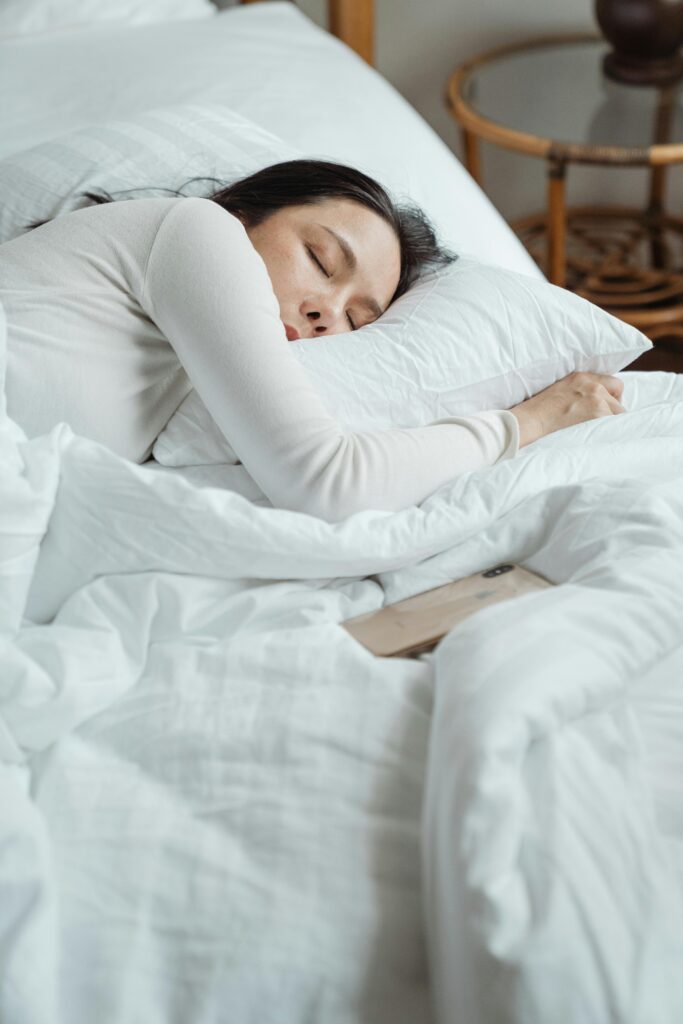In this day and age, many people have trouble falling asleep for various reasons. But fortunately, there are many strategies you can use to deal with this problem. So keep on reading to learn how to fall asleep faster.
How to Fall Asleep Faster: 8 Things You Can Do
1. Stick to a Consistent Schedule
You may have a habit of staying up late during weekends and then doing the opposite during the workdays. And while this behavior is quite common and natural, it can also prevent you from sticking to a consistent schedule.
And the more often you do this, the harder it’ll be for you to break this habit. So the best thing you can do is to go to bed at the same time every night.
This will help your body get used to a new routine naturally, signaling it that it’s time to fall asleep. After which you’ll be able to drift off to sleep faster.
2. Make Your Bedroom Dark and Stay Away from Digital Devices
The best way to get ready for bedtime is to make your bedroom dark. This means completely blocking any sort of light by covering your windows with blackout shades and drapes.
Or you can attach blackout film or cloth to the windows.
You can also use a sleep mask to take your sleeping experience to a new level and feel more comfortable.
Finally, avoid digital devices before bed, be it your computer, laptop, mobile or anything else. Why? Because they can negatively impact your circadian cycle, which will make it harder to fall asleep.
Blue light emanating from digital devices tricks your brain into believing that it’s daytime. This stops your brain from producing sleep-inducing hormone that helps you prepare yourself for bedtime.
This hormone is known as melatonin and is essential for your body. So allow your brain to produce it by staying away from digital devices as soon as you are in bed.
3. Pay Attention to the Room Temperature
Make sure your bedroom stays cool to make it as comfortable as possible. It’s recommended to keep the temperature between 60-67 degrees °F.
Your body naturally cools while sleeping, so cooling down the body tells your brain that it’s bedtime. This helps you fall asleep faster while improving your quality of sleep.
4. Make Sure You Don’t Have a Clock In the Bedroom
Usually, it’s helpful to know exactly what time it is. But at certain times, it can have the opposite effect, such as when you’re trying to fall asleep.
As a matter of fact, the more often you look at a clock, the more difficult it’ll be for you to sleep. But you’ve likely already noticed this if you tend to do this a lot.
So the best thing you can do is to make your bedroom clock-free. This will help you become less time-conscious and more focused on the falling asleep process.
5. Practice Mindfulness
Are your thoughts or anxiety preventing you from sleeping? Then mindfulness meditation may help.
More specifically, you should regularly practice mindfulness exercises that relieve stress.
Additionally, you can also include yoga, meditation, and journaling into your daily routine.
All these things can help you release stress and give you a peace of mind, making it easier to drift off to sleep.
6. Listen to Peaceful Music
Music has a powerful impact on your emotional, physical, and psychological states. So it’s no wonder it can help with sleep deprivation.
To test this yourself, try listening to some peaceful tunes before bed. You’ll quickly notice that your stress levels have declined and you feel much calmer than before.
7. Try Progressive Muscle Relaxation
Otherwise referred to as deep muscle relaxation, progressive muscle relaxation involves tensing every muscle group in your body (just one at a time) purposefully. And then releasing it. To learn muscle relaxation, you can use the audio training course. Alternatively, you can attend the in-person session if that is what you prefer.
Progressive muscle relaxation comes with both emotional and physical benefits. That includes reducing the negative effects caused by anxiety and stress, decreasing exhaustion levels, alleviating pain, and improved sleep.
8. Guided Imagery
Guided imagery is another relaxation method that can improve the quality of your sleep. It involves visualization of pleasant, peaceful scenes with you in it, such as you spending time on the beach, for example.
This can help you reduce anxiety and stress, giving you the peace of mind you need. And then drifting off to sleep will be so much easier for you.

Final Thoughts
Now that you know how to fall asleep faster, ensure to use these techniques and methods to your advantage so you can give yourself the quality of sleep you deserve.


